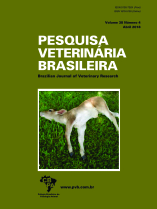 |
|
|
|
Year 2018 - Volume 38, Number 4
|

|
Identification of single nucleotide polymorphisms in the prion protein gene in Santa Ines and Dorset sheep, 38(4):624-628
|
ABSTRACT.- Andrade C.P., Barbosa Neto J.D. & Driemeier D. 2018. Identification of single nucleotide polymorphisms in the prion protein gene in Santa Ines and Dorset sheep. [Identificação de polimorfismos de nucleotídeos únicos em ovinos Santa Inês e Dorset através do gene da proteína priônica.] Pesquisa Veterinária Brasileira 38(4):624-628. Setor de Patologia Veterinária, Faculdade de Veterinária, Universidade Federal do Rio Grande do Sul, Av. Bento Gonçalves 9090, prédio 42505, Porto Alegre, RS 91540-000, Brazil. E-mail: cacauandrade@yahoo.com.br
Scrapie is a transmissible spongiform encephalopathy (TSE) that affects sheep and goats and results from accumulation of the abnormal isoform of a prion protein in the central nervous system. Resistance or susceptibility to the disease is dependent on several factors, including the strain of infecting agent, the degree of exposure, and the presence of single nucleotide polymorphisms (SNPs) in the prion protein gene. The most important polymorphisms are present in codons 136, 154, and 171. SNPs have also been identified in other codons, such as 118, 127, 141, 142, and 143. The objective of this study was to investigate the genotypic profile of Santa Ines (n=94) and Dorset (n=69) sheep and identify polymorphisms in the prion protein gene using real-time PCR techniques and sequencing. We analyzed SNPs in 10 different codons (127, 136, 138, 140, 141, 142, 143, 154, 171, and 172) in Santa Ines sheep. Classification of the flock into risk groups associated with scrapie revealed that approximately 68% of the Santa Ines herd was considered at moderate risk (group 3), and the most frequent haplotype was ARQ/ARQ (47.8%). For Dorset sheep, 42% of the herd was considered at moderate risk (group 3), 40% at low risk (group 2), and 12% at very low risk (group 1). These findings improve our understanding of the genotype breed and further highlight the importance of genotyping and identification of polymorphisms in Brazilian herds to assess their effects on potential infections upon exposure to the sheep prion.
|
| |
|
|
| |
|
 |